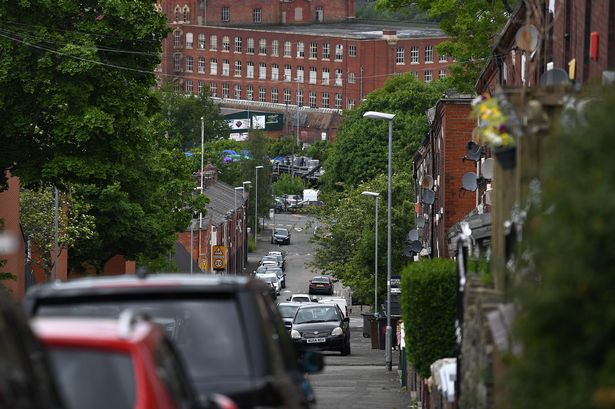The economy in Manchester continues to grow, yet Oldham is experiencing a troubling rise in deprivation levels. Recent data from the government’s Index of Multiple Deprivation reveals stark contrasts between the two areas. While Manchester witnesses an increase in wealth, Oldham’s residents struggle with worsening conditions, highlighting a significant regional disparity.
The Index of Multiple Deprivation ranks neighbourhoods across England into ten bands, with band one representing the most deprived areas. The latest assessment, conducted in March 2019 and compared against prior data, shows that 44 of Oldham’s 142 neighbourhoods have shifted into a more deprived band. In contrast, only 19 neighbourhoods have moved into a less deprived category. This means that approximately 31% of Oldham’s neighbourhoods are now worse off than six years ago.
In Manchester, the situation is markedly different. Over 36% of the city’s neighbourhoods, totaling 106 out of 295, have improved, moving into less deprived bands. Meanwhile, only 9%, or 26 neighbourhoods, have seen a decline.
Residents express deep concern about the impact of these changes. “Those statistics don’t surprise me. This place is on its knees,” stated Andrew Glynn, a 66-year-old retired journalist originally from Oldham. He pointed to the visible decline in local businesses and the overall feeling that the town is deteriorating. Glynn attributes this trend to Oldham’s historical reliance on its industrial base, which has not been replaced since its decline.
Issues such as a lack of job opportunities, increasing rents, and insufficient local government funding contribute to Oldham’s struggles. Many young people are leaving the area for cities like Manchester or London, exacerbating the economic challenges. These changing dynamics have had a tangible impact on residents’ lives, often described as “crushing.”
Among those feeling the pressure is Charlie, a 32-year-old mother who recounted her struggles while sitting on a bench in one of Oldham’s most deprived areas. “Ever since having my daughter, I’ve been the most worse off in my life,” she shared. Her partner lost his job in September, leaving them reliant on a meager £30 after paying their rent of £950. Charlie reflected on how rent has skyrocketed from £450 for a two-bedroom house eight years ago to over £950 now, without a corresponding increase in wages.
The sentiment of rising costs is echoed by other residents. Lisa, a 43-year-old support worker, noted that her rent increased from £650 to £700 in just one year. “It really just makes you worry about the money all the time. It’s constant stress,” she said.
Another resident, Milana, a 30-year-old who faced homelessness in Manchester, described the challenges of finding stability in Oldham. After injuries prevented her from working, she took a job at a school but continues to face obstacles that hinder her progress. “It feels like no matter what you do, you try so hard to improve your situation and you just get kicked back down,” she explained.
Despite these struggles, some areas of Oldham have seen slight improvements. Government statistics indicate that three neighbourhoods bordering Manchester have moved to less deprived bands. However, many residents remain skeptical about the overall progress.
“I don’t think it’s changed much,” said Janet Harding, a 69-year-old lifelong resident of Failsworth. She appreciates the community feel of her area, which is well-connected to both Oldham and Manchester. Others, like a local resident identifying himself as Brian, believe Failsworth benefits from its proximity to Manchester, noting the ease of transportation but questioning the availability of jobs.
While some neighbourhoods may experience relative stability, the broader picture for Oldham is grim. Families across many areas grapple with the realities of homelessness, child poverty, and rising unemployment. The disparities between Oldham and its more prosperous neighbour illustrate the urgent need for targeted interventions to address the growing inequality affecting residents.







